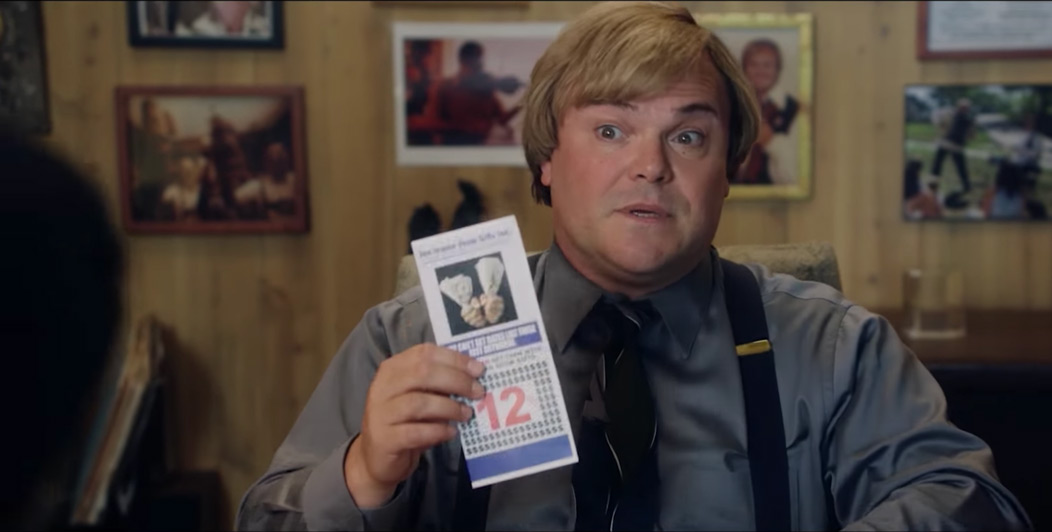‘The Polka King’ Explores the Unjustly Maligned and Ignored Musical Tradition
Jack Black Stars as Real-Life Bandleader Jan Lewan

I belong to the tiny subculture of polka fans, loving the music both genuinely and ironically, and believing this unjustly maligned and ignored music tradition is one of the great “underground” musical cultures in America. Imagine my delight, then, when I tuned in to The Late Show with Stephen Colbert recently and saw Jack Black — in a gaudy red suit and blond wig, emanating over-the-top-cheerful charisma — leading a crack polka band to promote the film The Polka King, which premiered at last year’s Sundance festival and had its Netflix debut on January 12.
However, my delight was followed by semi-disappointment on the musical front when I watched the film the following night only to find that polka itself is mostly a backdrop and an incidental feature. Instead, The Polka King is more obsessed with another five-letter “p” word: “Ponzi.” Directed by Maya Forbes and written by Forbes and Wallace Wolodarsky, based on the documentary The Man Who Would Be Polka King, the film is the real-life story of determined (and ethically slippery) polka bandleader and Polish immigrant to Pennsylvania Jan Lewan (pronounced with the Americanizing hard “j” or without — he doesn’t care), so eager to assimilate into his adopted country’s lifestyle and enjoy its fruits that he almost accidentally segues into a life of fraud.
“I have America up the wazoo,” says the charmingly upbeat and endearingly language-mangling Lewan (Jack Black). “All you have to do is believe.” His powerful belief in America, feeding the family, and upward mobility was lined with fraudulent investor duping, which landed him in prison in 2004. Thus, his story also takes on that pressing American-dream story — the one about dreams turned to disillusion on an epic scale.
On some level, The Polka King is a misdemeanor-level variation on the chilling film The Wizard of Lies, which starred Robert De Niro as Bernie Madoff, that evil king of all things Ponzi whose mendacity and wanton greed started out small and ballooned exponentially. It is the very buoyant and trust-inducing charisma of Lewan, on- and offstage, that lures investors into his world, along with the unreal promise of 12 percent returns on the investments (“Welcome to the ground floor of big beginning,” he promises his first victims). Like any good American entrepreneur, he diversifies, dreaming big and wide: Lewan also runs a Polish gift shop, is a tour guide with a “Premium Pope Package” (a back-alley bribe helps that Papal audience happen), and operates other businesses, alongside keeping his band going and paid.
Director Forbes pulls some fascinating punches along the way. Delving into the world of polka culture with delicate balance and respect, the film speaks to the alarm we might feel that such a world exists beneath the slick noise of mass/pop culture in America. We at once are immersed in said polka-lined world and view it from a half-satirical, Christopher Guest–like remove. Acting-wise, tart and tasty comic turns come from Jason Schwartzman as Lewan’s polka-band sidekick Mickey Pizzazz (a stage name, by the way), Jacki Weaver as his suspicious mother-in-law, and Jenny Slate as his long-suffering and Mrs. Pennsylvania–aspiring wife.
As for Black, he rocks in the role, but there are limitations attached. Ultimately, the fact of the film’s obligation to reality, and the fact that the real Lewan is still alive (he performs, all smiles and high on a sense of resurgence, in the final polka/rap tune) means that Black’s Lewan feels restrained, by the wild standards Black has brought to characters such as his Mexican wrestling would-be hero in Nacho Libre or even the outlandish rock ’n’ roll character(s) in his band Tenacious D.
It would be great to see Black expand his giddily masterful Polka King role, but next time, a little or a lot more polka, please. For more on that, proceed to the soundtrack album for some pure-ish polka bliss.



